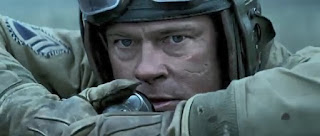As an amateur history buff, one of the most depressing, and infuriating, reads I've ever encountered was Death Traps (1998) by Belton Cooper, who gives a first-hand autobiographical account on the massive short-comings of the M4 Sherman when stacked up against the far superior German panzers during World War II. For the only advantage the American tank had was speed and mass-production; with the disadvantages being little to no armor, and not-near-effective-enough firepower.
And so, as the Sherman’s fired shells impotently bounced off of their opponents, the German 88mm guns usually made short-order of their American counterparts, making them, indeed, death-traps, with an appalling casualty rate for those trapped inside of them. And why that's so infuriating, is because it didn't have to be that way.
Seems as America entered its third year of the war, a critical -- and some would argue, criminal -- decision was made to forgo retooling for the production of the newly minted M26 Pershing tank and stick with the Sherman. This decision was backed by General George S. Patton, the leading American authority on tank warfare at the time, who favored the lighter and more mobile Sherman, feeling tanks were not supposed to fight other tanks but bypass them, and then attack the enemy infantry from the rear.
And while General Eisenhower agreed with this assessment, judging by the evidence provided by Cooper, who had served in the 3rd Armored Division under Patton, this decision was a disaster that "lengthened the war and became a literal death sentence for thousands of Allied tank-crew members."
Now, all of this came crashing to the forefront when I finally sat down and watched David Ayer's Fury (2014), which focuses on one such tank crew; who, after surviving North Africa, D-Day, and the Bulge miraculously intact, finally suffer their first casualty as the Allies push across the Rhine and into Germany.
Of course his replacement, Ellison (Lerman), is both green and highly unqualified as an assistant tank driver, which rings somewhat true as, by 1945, whatever warm bodies that could be mustered were used to plug-up the holes on the front-lines. And while the shunned and misplaced file clerk goes through a trial by blood and fire, where subtlety and nuance are kinda ground-up underneath the advancing tank treads, sure, it all rings a little too close to the been there, done that, misplaced translator from Saving Private Ryan (1998).
But in Ellison’s defense, from the deified tank commander, Don 'Wardaddy' Collier (Pitt), to the bible-thumping Swan (LeBeouf), to the token minority, Gordo (Peña), and Travis the hick (Bernthal), the rest of the crew is an even bigger cache of cliches. However, the acting from all involved is really quite good and do the best they can to elevate what they're given by Ayer, who also wrote the script, canceling out some of these concerns.
Where the film positively excels, however, is when Ayers brings out the constant anxiety of the crews and the fear and the effectiveness of these tankers each time they go into battle. The combat scenes are incredibly staged, brutal and harrowing. And the sequence where a dreaded King Tiger tank ambushes them and wipes out a whole column, and the ensuing game of cat and mouse that follows to neutralize the damnable thing, epitomizes everything Cooper was lamenting about in his book, which is mentioned in the film’s credits as inspiration.
Also, in Fury’s quieter moments, I haven't seen a war film take the piss out of romanticizing service and de-glamorize combat this much since Carl Foreman's equally depressing, The Victors (1963). And though I did appreciate what Ayers was shooting for, something a little deeper, in the end, I think he kinda played out his "war is hell" cards with too heavy a hand.
And strangest of all, as we head into massive Spoiler Territory, everything Ayers and his veteran characters were preaching against, and the philosophy of caution that kept them alive thus far, is summarily ignored for a climax that is fairly ridiculous in its last stand, John Wayne-ishness as the lone tank and her crew suicidally defends a crossroads against an overwhelming battalion of SS troops.
Again, the final battle is executed quite brilliantly on a technical level, but ends just like you know it will. And here, Ayers blew a golden opportunity to add a poignant coda to his film, adding a bittersweet punch to the stomach on the sacrifice of the Fury's crew, which brings us full-circle and back to Cooper's book.
See, Cooper served in a unit that was in charge of recovering damaged and knocked-out tanks and making them serviceable again; another direly grim advantage the Americans had over the Germans, leaving no doubt that Fury, the tank, would've been patched up, hosed out, repainted, refitted, and back on the line with a brand new crew in less than two days after the climactic battle. Sad, but true.
Now, despite all of the gripes and missed opportunities, I'm happy to say the good outweighs the bad and I enjoyed this movie a whole lot. It was just frustrating, and a little counter-intuitive, and that keeps Fury from being as great as it could and should've been.
Originally posted on April 9, 2015, at Micro-Brewed Reviews.
Fury (2014) QED International :: LStar Capital :: Le Grisbi Productions :: Crave Films :: Huayi Brothers Media :: Columbia Pictures / EP: Anton Lessine, Alex Ott, Brad Pitt, Sasha Shapiro, Ben Waisbren / P: David Ayer, Bill Block, Jeremy Johns, John Lesher, Ethan Smith / AP: Owen Thornton / D: David Ayer / W: David Ayer / C: Roman Vasyanov / E: Jay Cassidy, Dody Dorn / M: Steven Price / S: Brad Pitt, Shia LaBeouf, Logan Lerman, Michael Peña, Jon Bernthal

%202014.jpg)














%202014.jpg)
No comments:
Post a Comment